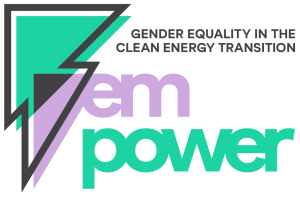The Clean Energy sector is a traditionally male-dominated field but the EU-funded project FemPower (2021-1-EL01-KA220-HED-000030178) has been inspiring change by helping scientists in seven countries to better understand how gender equality can benefit the field.

Τhe Clean Energy Transition (CET) has been recognized both on an EU and an international level as a strategy of major importance towards the reduction of greenhouse gas emissions and the fight against climate change. Gender inclusion and diversity arises as an important factor in the CET, since women are underrepresented in the energy sector, and energy research rarely considers aspects of gender, even though ideas and behavior differ among genders. At the same time the CET has to be accelerated and completed as soon as possible in order to mitigate the harmful human impact on the environment. In order to ensure a just and gender-equal CET, it is necessary to increase female representation in the sector, empower and prepare those who are already active in academia or the market, and integrate the gender dimension in research and development.
Breaking down barriers
All partners of the FemPower consortium are active in the field of Clean Energy Transition, Gender Equality or STEAM education. They are very diverse in their Legal Form (Higher Education Institutions, NGOs, SME, public bodies) and their field of expertise (Energy Studies, Interactive Design, Learning Innovation, STEAM, Gender equality, Social innovation). This diverse background and nature of the partners will create a fruitful and necessary space for collaboration since the CET requires not only transnational but also cross-sectoral and multidisciplinary approaches to tackle the technical, societal, economic challenges that arise.
Through FemPower all partners will increase the quality and relevance of their activities, develop and reinforce their networks of local/regional/national/EU and international partners, increase their capacity to operate jointly at transnational level, boost internationalisation of their activities, and through exchanging or developing new practices and methods as well as sharing and confronting ideas.
The consortium will develop tools, methodologies, Open Educational Resources, a peer Learning Network and a cross-sectoral multidisciplinary collaboration that will increase inclusion and diversity in the Clean Energy Transition, develop STEM/STEAM in higher education, in particular women participation in STEM and promote interest and excellence in science, technology, engineering, and mathematics (STEM) and the STEAM approach. The FemPower Summer School will also take place in August 2023 in Thessaloniki and will offer the opportunity to the partners to implement for the first time in a synchronous way the variety of educational methodologies that will be developed collaboratively inside FemPower. Αn equal number of female and male students will be accepted to participate in the Summer School, reaching a total of 46 students, 20 among which will be recruited from AUTH, while the rest will be recruited from POLIMI, CUT, CPN, UPV/EHU and TUDelft. Participants will be coming from a diverse background of studies from the 5 HEIs involved and CPN in order to create a multidisciplinary and international environment during the Summer School.
Towards gender equality in CET
The FemPower project revolves around the need to mitigate the current gender inequalities in the field of CET and to increase skillful female participation in Higher Education and research. FemPower will develop innovative gender-inclusive educational and research approaches by integrating the gender aspect in the CET activities of the cross-sectoral and multidisciplinary consortium of stakeholders.
Female and male individuals who will decide to get involved and engaged into project activities will have the opportunity to become aware of the gender aspect that influences their decisions, attitude and behaviours.This gender sensitization will provide them with a greater understanding and responsiveness to all kinds of diversity, and to reproduce a culture of equal opportunities at and for their own surroundings once the project is completed. Staff from the involved HEIs will be trained in innovative gender-inclusive cooperation and STEAM educational strategies.This facet of the program will enrich their teaching and research toolkits with methodologies that enhance creativity, innovation and problem-solving skills. Female individuals will also have the opportunity to participate in the Strategic Network for Women in Energy that will create strong international links useful for their careers and research.
Production of specific energy gender mainstreaming procedures and gender-inclusive educational approaches is expected to open more opportunities for female participants (as students, scholars, professionals/employees) as well as consumers and energy-sensitized citizenship. By making broadly available specific guidelines for gender mainstreaming the knowledge, labour and pay gap is in the long term expected to bring about greater equality. Diverse and inclusive energy transition ensures commitment of greater audiences needed for an all embracing social change. Last, relevant stakeholders will benefit from the project from the fact that co-creation and gender mainstreaming tools and guidelines produced, will bring opportunities for improved, gender-sensitized, and gender-inclusive planning. strengthen their cross-sectoral and multidisciplinary collaborations through the participation of their female representatives in the Strategic Network of Women in Energy.
Project website: https://fempower.ee.auth.gr/
Project details
Project acronym: FemPower
Project title: FemPower: gender equality in the clean energy transition
Project code: 2021-1-EL01-KA220-HED-000030178
Project coordinator: Greece – Aristotelio Panepistimio Thessalonikis (AUTH)
Project participants: Greece – Centre for Research on Women’s Issues Greece (Diotima)
Italy – Politecnico Di Milano (POLIMI)
Cyprus – Cyprus University of Technology (CUT)
Serbia – Centar Za Promociju Nauke (CPN)
France – Digijeunes
Spain – Universidad del Pais Vasco (UPV/EHU)
Netherlands – Technische Universiteit Delft (TUDelft)
Netherlands – Duneworks
Project duration: February 2022 – July 2024